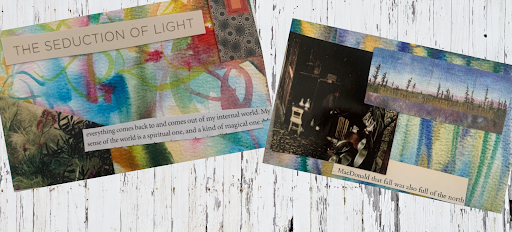
How can one go further without welcoming Winter, knowing it will be cold and have an element of desolation
but also sensing the beauty of this bareness?
-Llewellyn Vaughan-Lee
Grief into Growth
During one of my darkest periods, I left a well-paying, approval-generating job because of the costs of the work culture to my life force. Then I paused and wondered what mattered most for my next job. To my surprise, the response that came was to work with kind people. There was a lot of room for interpretation in this answer and I applied for many positions. The one I took was with Bereaved Families of Ontario (BFO), in Ottawa, a small non-profit organization which provides grief support.
One of the orientation requirements for my new role was to participate in the peer support groups BFO offered. At the time, my body winced from grief – two pregnancies, a relationship, a home, parts of the job I’d left. Despite sharing this in my job interview, I’d been hired. Secondary and less conscious losses also exerted an influence – identities, hope, self-esteem, capacity. It was hard to leave the house.Part of me wanted to want to live. Other parts didn’t or couldn’t.
Walking into a church basement for my first experience of Support and Share night, I was struck by two experiences. The first was the concentration of undiluted sorrow that filled the room – thick and undulating. The second was that encountering this place of sorrows was more comforting than anything anyone had said in response to learning what was hard in my life at that time. Here was a place where I could be as I was, feeling what I was feeling, in community.
Larger than the suffering was the power and space of non-judgement, one of the guidelines for participating in a support group. Being there nurtured acceptance of what was – the fact of endings, the emotional landscape that came with endings and hard changes, the need to move towards what I wanted to recoil from for shifts to happen.
Listening, I was surprised by how many times I recognized myself in what was shared in the group. After hearing one woman after another wonder about the correlation between choices she had made and the loss of her pregnancy or infant, I saw the collective female gaze mirrored in me. The Light of the group opened the possibility of dropping an evaluation of failure from my experiences of loss.
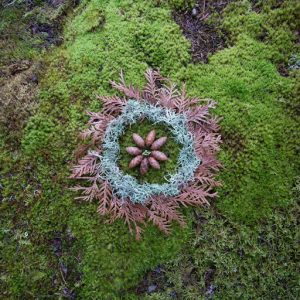 Women who were further along in their grief journeys were finding pathways to positive relationships with their bodies, the place where the beings they loved had lived and died. People whose losses seemed impossible to me, calmly facilitated groups. I was able to say and ask things I couldn’t speak or ask anywhere else. The distress that fortified a perception of separateness when I tried to bear it on my own, revealed our connective tissue.
Women who were further along in their grief journeys were finding pathways to positive relationships with their bodies, the place where the beings they loved had lived and died. People whose losses seemed impossible to me, calmly facilitated groups. I was able to say and ask things I couldn’t speak or ask anywhere else. The distress that fortified a perception of separateness when I tried to bear it on my own, revealed our connective tissue.
Over time and through experience, I learned that most people who were compassionately witnessed following a loss and authentic with themselves, expanded. They became more compassionate, honest, generous, and accepting. They emerged from a time where they wondered if they would ever laugh again or feel whole to a place where they had energy for new projects and an emboldened orientation for how they wanted to show up in the world. Many of these people powered the largely volunteer-run organization that was BFO. Many went on to serve life in other ways. Here were the kind people I needed and was called to meet.
Honouring Our Pain
Grief is like mycelium, a hidden understory of connection that lives within. When one loss is acknowledged, other losses needing attending are also touched. So while someone may have come through the door because they lost their parent or friend, I might learn that the one they were equally missing was the german shepherd who died two months prior or the family farm paved over for a new suburb. I heard many people mourn for more-than-human beings. Many times, I did the same. Conditioned to feel threatened for naming what they’d learned to disenfranchise, participants sometimes pulled back after these spontaneous disclosures. Speaking these losses is like the Sanskrit seed syllable ‘ah,’ which stands for all voices not yet spoken, all voices not yet heard. The resonance of these shares always touched me deeply.
Gradually I realized that I wanted to offer a place of welcome for a specific branch of hidden sorrows, now called ecological grief. At the time there was no name for the emotional consequences of anticipated or actual environmental changes, the need to mourn the loss of ecosystems, landscapes, species and ways of life. How would I find the people who needed it? Would anyone come? Is it possible that the land needs this to? Is it possible to give the land a voice in these processes?
Two weeks later, a colleague and friend asked if I would facilitate a workshop for exactly this purpose.
As life on earth intensifies through a convergence of human-induced crises, this work is both what I need to sustain my resilience and part of what I understand my role in the ecosystem to be.
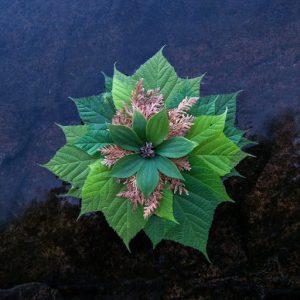 This autumn, I’m calling the workshops that I’m offering Cultivating Climate Courage in Community. As part of these gatherings, each person is invited to express their pain for the world in pairs or small groups. While this is happening, the role of others is to bear witness. I call this a practice because for most people it’s uncomfortable. What I’m learning from grief and yoga is that these places of discomfort are edges to lean into, fertile for learning and growth. Leaning in requires bravery. The challenge is to stay open.
This autumn, I’m calling the workshops that I’m offering Cultivating Climate Courage in Community. As part of these gatherings, each person is invited to express their pain for the world in pairs or small groups. While this is happening, the role of others is to bear witness. I call this a practice because for most people it’s uncomfortable. What I’m learning from grief and yoga is that these places of discomfort are edges to lean into, fertile for learning and growth. Leaning in requires bravery. The challenge is to stay open.
Scholar of Systems Theory and Buddhism, Joanna Macy, whose body of work I structure my own on, calls this practice honouring our pain. Joanna is precise in her choice of words, suggesting that we not only endure these uncomfortable sensations, but honour that which is difficult to feel. When we learned that part of the truth of our land is that She holds the unmarked graves of untold numbers of Indigenous children or 70 percent of the Northwest Territories were on fire last summer, many people felt something uncomfortable inside.
According to systems theory, if we miss, dismiss or avoid these sensations, we block the feedback loops we need to regulate, to self-correct, to make the decisions we need to make for life on earth. These sensations are life’s energy moving through us, Divine Mother’s blood. From this perspective, sorrow, fear, and anger aren’t weaknesses, nor something to be ashamed of, but intelligent responses to the threats facing our planet. They’re integrity trying to come back into the system.
So we practice being with each other’s suffering without turning away or trying to take it away. We witness to learn what’s needed to be in solidarity. We witness as solidarity. The reason we practice is because if we can’t stay with what’s hard in ourselves, another human or any being, we look away. When we look away, parts of ourselves or other beings get left behind.
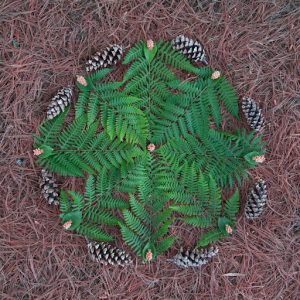 According to evolutionary cosmologist, Brian Swimme, 95% of future life is dependent upon human awakening. When I try to be with this on my own, it’s too much. That’s one of the reasons I facilitate group work. The Circle can take and compost far more than my individual nervous system. So far, the Circle has taken everything in.
According to evolutionary cosmologist, Brian Swimme, 95% of future life is dependent upon human awakening. When I try to be with this on my own, it’s too much. That’s one of the reasons I facilitate group work. The Circle can take and compost far more than my individual nervous system. So far, the Circle has taken everything in.
Later on in the workshops, we plant ideas, wishes, poems and prayers in these composted emotions for new and ancient ways to live and relate to all life. At last weekend workshop’s, people spoke pledges to tend a community garden for native plants, convert an old home into a green home, show up as the father he wants to be. All these seeds and seedlings rooted in a common desire to try to pivot towards life.
Seeing with New and Ancient Eyes
The seed I always want to plant is the same. I want to be like wild Rose.
It’s late autumn as I write this story. Ferns erupt like green fountains from brown and copper leaves covering the forest floor. I walk the mud road to a place where Rose grows on the shore of Tenagadino Zibi, the air here carrying salty scents from the river.
Rose’s leaves are yellow and khaki. We greet and I ask to harvest a rosehip to plant seeds in my new garden, then stand still and wait. Sensations arrive in my body, vibrations by which plants communicate. The feeling like a bulrush going to seed in my heart. Rose consents.
At home, I eat the bitter juicy fruit, spit thirty-seven seeds into a bowl – small, hard, white potential. Come winter, I’ll sow them in plastic containers filled with soil. The seeds like most metamorphoses, requiring darkness to grow.
To me Rose is plant, elder and bodhisattva. In my experience, Rose emanates love as a vibration, as medicine, no matter how I show up or how long it’s been since I last stopped by. As far as I can tell, Rose constantly and freely emanates love to anyone and everyone.
So, I’m literally planting the seeds who are Her offspring in the hopes that they’ll grow and survive transplanting into my garden next spring – in support of pollinators, in support of my human and more-than-human neighbours, in support of my nervous system, and to bring this teacher near – to deepen and expand my apprenticeship in love.
I want to grow the capacity to emanate love as self-care and planetary care. I want to remember to emanate helpful vibrations throughout my days and nights, as a way to balance the costs of my life on Earth, as an offering to contribute to rebalancing the world.
What seed do you wish to plant for yourself, for Earth or for someone you love and are missing?
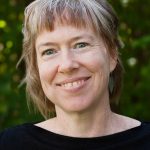 Robin Macdonald is a spiritually-rooted facilitator, moving at the intersections of social justice, earth care, spirituality and mental health. Part of the Scottish-Irish diaspora living on unceded Algonquin Anishinaabe territory, also known as Wakefield, Quebec. Robin is a restorative justice practitioner, communal grief and Work that Reconnects facilitator, Yasodhara Yoga teacher and writer. Core to her work is the role of community in healing and thriving. Learn more about Robin’s work at Grief Into Growth and about Joanna Macy’s teachings.
Robin Macdonald is a spiritually-rooted facilitator, moving at the intersections of social justice, earth care, spirituality and mental health. Part of the Scottish-Irish diaspora living on unceded Algonquin Anishinaabe territory, also known as Wakefield, Quebec. Robin is a restorative justice practitioner, communal grief and Work that Reconnects facilitator, Yasodhara Yoga teacher and writer. Core to her work is the role of community in healing and thriving. Learn more about Robin’s work at Grief Into Growth and about Joanna Macy’s teachings.
Nature Mandalas by Barbara Brown
Collages by Robin Macdonald


Comments are closed.